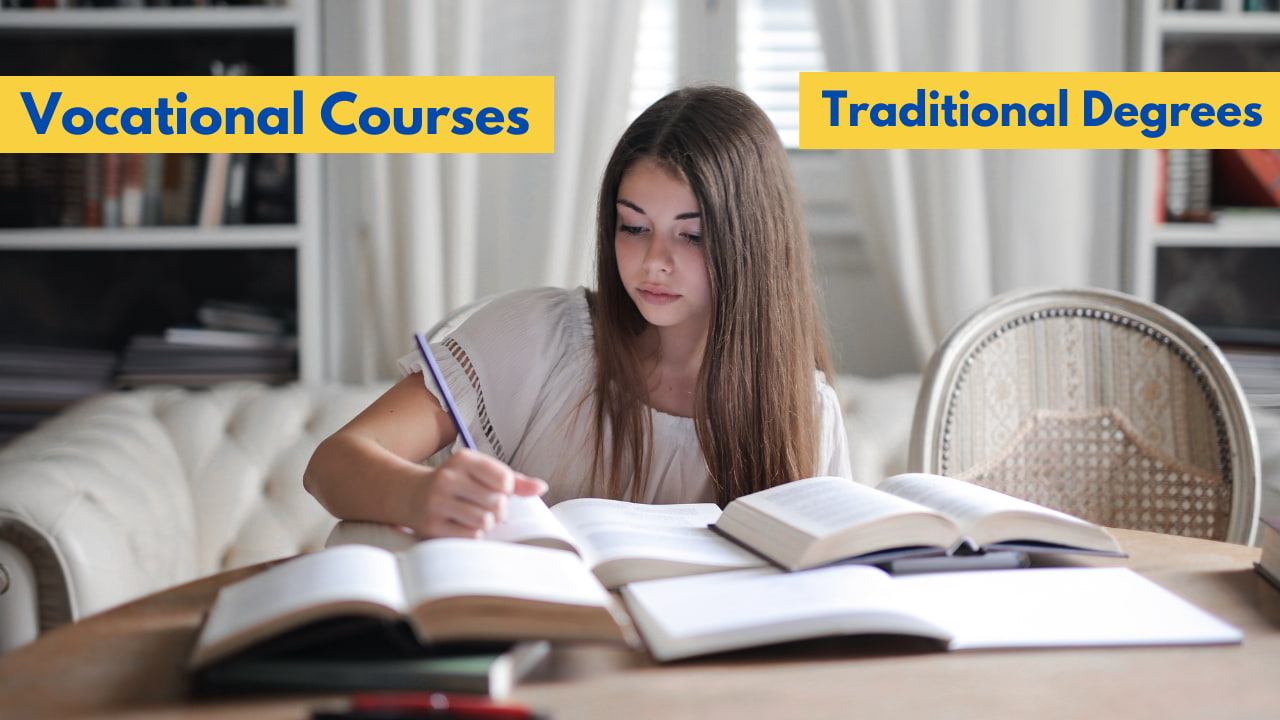As you grow older, you may start thinking about what you want to do after finishing school. One of the biggest decisions is choosing between vocational courses and traditional degrees. Both options can help you build a successful future, but they are very different in terms of what they teach and how they prepare you for a career.
Let’s explore the differences between vocational courses and traditional degrees, and help you figure out which one might suit you better.
What is a Vocational Course?

A vocational course is a type of education that focuses on teaching specific skills for a particular job or profession. These courses are designed to be practical and hands-on, helping you learn things that you can directly use in the workplace. For example:
- Carpentry
- Electrician training
- Plumbing
- Tailoring
- Computer programming
Vocational courses usually last for a shorter time, ranging from a few months to two years. They are perfect for students who want to quickly learn a skill and start working.
What is a Traditional Degree?
A traditional degree is a more general form of education that focuses on academic subjects like science, arts, commerce, and engineering. These degrees often take longer, usually 3 to 4 years, and focus on building knowledge in a broader field. For example:
- Bachelor of Science (B.Sc.)
- Bachelor of Arts (B.A.)
- Bachelor of Commerce (B.Com.)
- Engineering (B.Tech.)
While traditional degrees cover a wide range of subjects, they don’t always focus on practical skills for a specific job. Instead, they prepare you for a variety of careers by giving you a strong foundation in the subject you choose to study.
Key Differences Between Vocational Courses and Traditional Degrees
Let’s look at some key differences between these two types of education:
1. Focus on Learning
- Vocational Courses: Focus on practical skills that you can use directly in a job. For example, a course on electrical work will teach you how to fix wiring and electrical systems.
- Traditional Degrees: Focus more on theory and general knowledge. You will study a broad range of subjects in your chosen field but may not get as much hands-on experience.
2. Duration of Study
- Vocational Courses: Usually take 6 months to 2 years to complete. They are shorter because they focus on specific skills.
- Traditional Degrees: Usually take 3 to 4 years to complete. They cover more topics, so they take longer.
3. Job Readiness
- Vocational Courses: Make you job-ready as soon as you finish the course. Since they teach specific skills, you can start working in that field right away.
- Traditional Degrees: May not prepare you for a specific job right after graduation. You may need additional training or experience to start working in your chosen field.
4. Cost of Education
- Vocational Courses: Are generally cheaper because they are shorter and focused on one specific skill.
- Traditional Degrees: Can be more expensive because they take longer to complete and may require more resources like books, lab equipment, and other materials.
5. Career Options
- Vocational Courses: Prepare you for a specific career. For example, a course in carpentry will prepare you to become a carpenter. The skills you learn are directly related to the job.
- Traditional Degrees: Give you more flexibility in choosing a career. For example, a degree in commerce can lead to careers in accounting, finance, or business management. You can explore different career paths based on the subject you studied.
Who Should Choose Vocational Courses?
Vocational courses are a good choice if:
- You want to start working quickly after finishing your education.
- You have a clear idea of what job or career you want to pursue, like becoming a mechanic, fashion designer, or electrician.
- You enjoy hands-on learning and want to develop practical skills.
- You prefer a shorter and more affordable educational path.
For example, if you love working with computers and want to become a software developer, you can take a coding course and start working within a year or two.
Who Should Choose Traditional Degrees?
Traditional degrees are a good option if:
- You want a broad education that allows you to explore different subjects.
- You are not yet sure about which career you want to pursue and want to keep your options open.
- You are interested in fields that require in-depth study, like medicine, engineering, or law.
- You enjoy theoretical learning and are willing to study for a longer time to build a strong academic foundation.
For example, if you want to become a doctor or an engineer, a traditional degree is necessary because these careers require a lot of knowledge and specialized training.
Pros and Cons of Vocational Courses
Pros:
- Short duration: You can complete your course and start working quickly.
- Job-ready: You learn practical skills that can help you find a job immediately.
- Affordable: Vocational courses are usually less expensive.
Cons:
- Limited career options: Vocational courses prepare you for a specific job, so you may not have as many career choices.
- Less flexibility: It may be harder to switch to a different field later if you want to try something new.
Pros and Cons of Traditional Degrees
Pros:
- Broader knowledge: You learn about a variety of subjects, giving you more career options.
- Higher qualifications: Many jobs, especially in fields like medicine, law, and research, require a traditional degree.
- Flexibility: You can switch to different career paths based on your degree.
Cons:
- Longer duration: You will spend more time studying, usually 3 to 4 years.
- Higher cost: Traditional degrees can be expensive, especially if you study at a university.